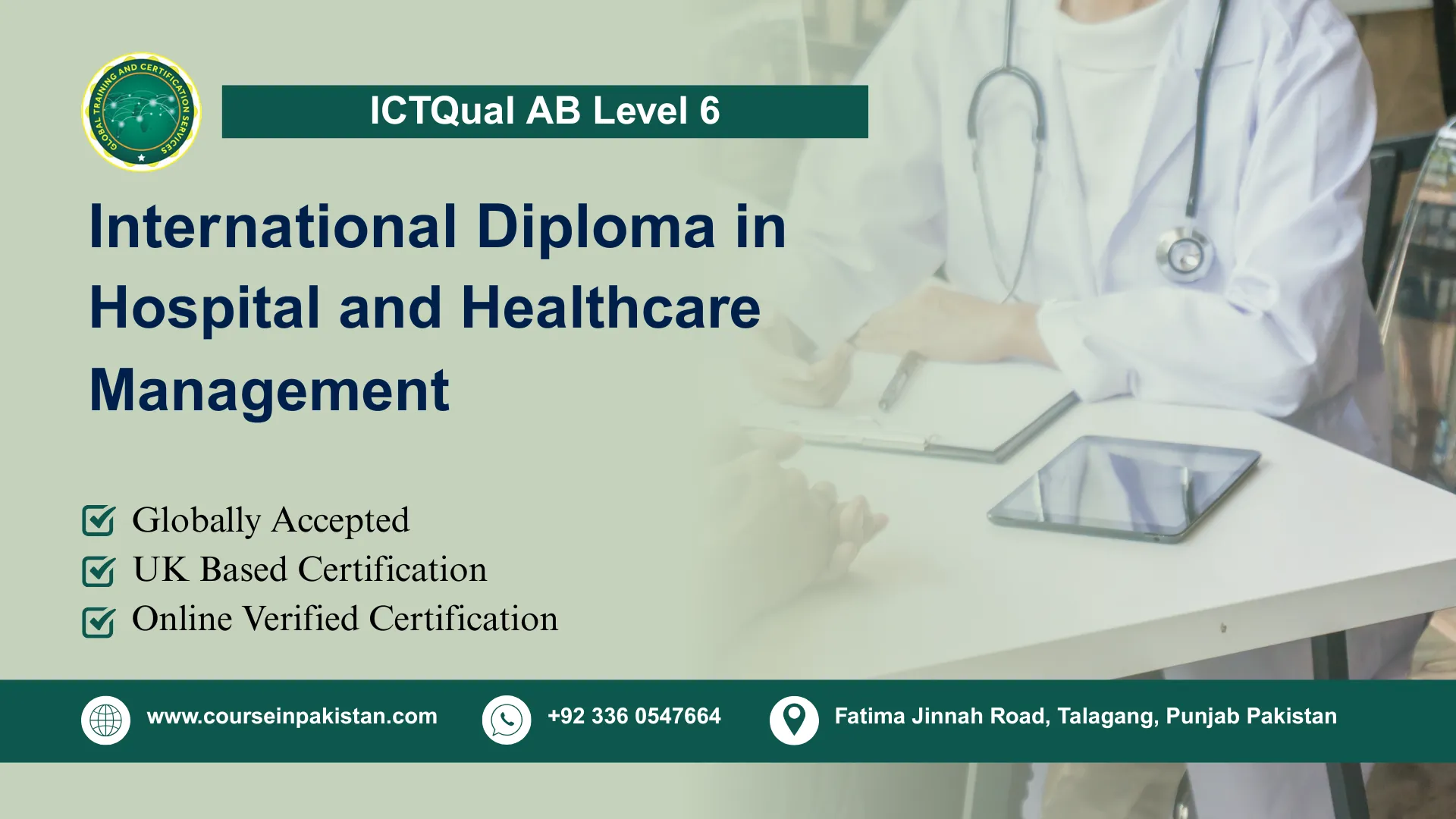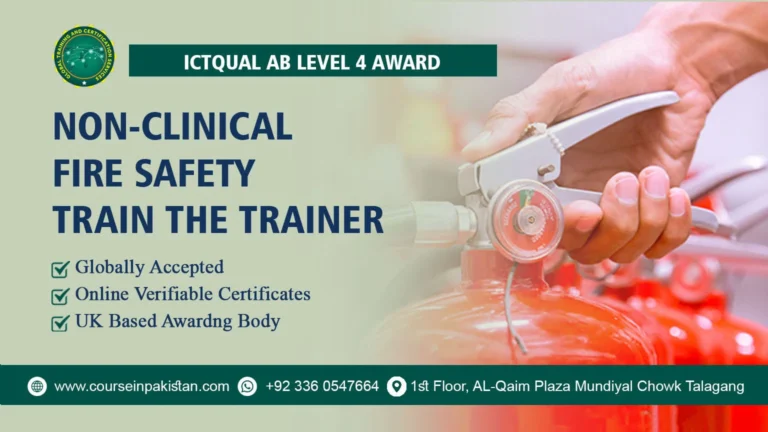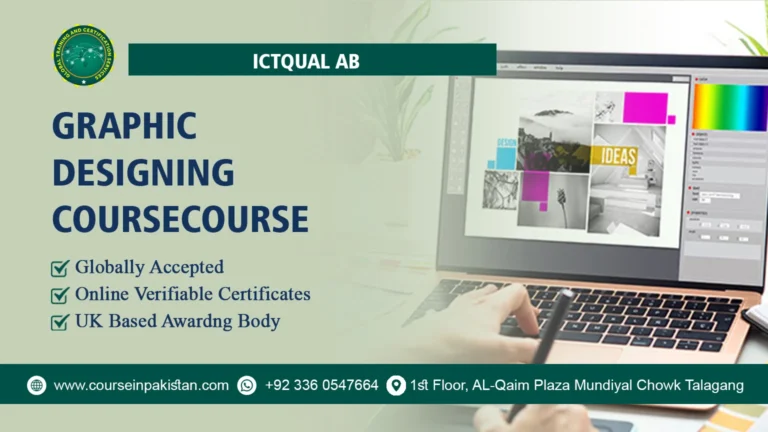
The ICTQual AB Level 6 International Diploma in Hospital and Healthcare Management is a highly specialized program designed to provide learners with advanced knowledge and skills to efficiently manage healthcare facilities. This course covers critical areas such as hospital administration, healthcare policies, quality management, patient care, financial management, and healthcare technology. Learners will gain the expertise required to oversee hospital operations, optimize resource allocation, ensure compliance with healthcare regulations, and implement effective patient-centered strategies.
This diploma integrates theoretical foundations with practical management applications, preparing learners to excel in diverse healthcare settings such as hospitals, clinics, nursing homes, and healthcare organizations. Graduates will be equipped to lead healthcare teams, manage administrative and clinical operations, and contribute to the strategic development of healthcare services worldwide.
Course Overview
The ICTQual AB Level 6 International Diploma in Hospital and Healthcare Management is a 360-credit, fully assignment-based qualification, allowing learners to study at their own pace from anywhere in the world. It is British Council verificable and MOFA/Embassy attestable, ensuring international recognition for employment, career growth, and iqama approval.
This qualification caters to both fresh learners and experienced professionals. Fresh students are required to complete all 36 mandatory assignments within three years. Experienced professionals with at least 6 years of relevant healthcare or hospital management experience can achieve certification in a shorter time by submitting verifiable experience and defending their knowledge during professional discussion assessments with an ICTQual AB approved assessor, without completing all mandatory assignments. Completing this diploma equips learners with the strategic, operational, and leadership skills required to excel in healthcare management globally.
Key Highlights of the Course:
- Fully 360-credit Level 6 diploma, flexible and self-paced study
- British Council verificable and MOFA/Embassy attestable qualification
- Suitable for fresh learners and experienced healthcare professionals with accelerated pathways
- Focus on hospital administration, patient care, and healthcare operations
- Globally recognized for career advancement and iqama approval
Course Benefits
Career Advancement
- Prepare for managerial and leadership roles in hospitals, clinics, and healthcare organizations
- Enhance employability in healthcare administration, operations, and quality management
- Gain recognition for expertise in hospital operations, patient care management, and regulatory compliance
Professional Recognition
- Obtain a British Council verified and MOFA/Embassy attestable qualification
- Validate professional experience for accelerated certification
- Strengthen credibility for international healthcare management careers
Flexible Learning
- Complete the diploma entirely through assignment-based study at your own pace
- Accelerated completion option for experienced professionals
- Study from anywhere in the world without classroom constraints
Practical Skills Development
- Learn to implement healthcare management strategies and operational best practices
- Develop skills in resource management, financial planning, and patient-centered care
- Enhance problem-solving, decision-making, and leadership abilities in healthcare contexts
Academic and Professional Pathways
- Foundation for postgraduate studies in Healthcare Management, Public Health, or Hospital Administration
- Advanced certifications in healthcare quality, patient safety, and medical operations
- Opportunities to join global healthcare networks for professional growth
Course Study Units
This qualification, the ICTQual AB Level 6 International Diploma in Hospital & Healthcare Management 360 Credits – Three Years, consists of 36 mandatory units.
Year 1: Foundation in Hospital & Healthcare Management
- Introduction to Psychology and Mental Health
- Human Development and Behaviour
- Fundamentals of Cognitive and Behavioural Psychology
- Introduction to Abnormal Psychology
- Principles of Counselling and Therapy
- Research Methods in Psychology
- Psychological Assessment Techniques
- Introduction to Neuropsychology
- Ethics and Professional Practice in Mental Health
- Communication Skills in Clinical Settings
- Health and Safety in Mental Health Environments
- Introduction to Stress and Coping Mechanisms
Year 2: Intermediate Hospital & Healthcare Management
- Strategic Planning and Decision-Making in Healthcare
- Advanced Healthcare Finance and Resource Management
- Human Resource Management in Hospitals
- Patient-Centred Care and Service Excellence
- Healthcare Operations and Logistics
- Risk Management and Compliance in Healthcare
- Project Management in Healthcare Settings
- Evidence-Based Practice in Healthcare Management
- Leadership Skills for Healthcare Professionals
- Healthcare Marketing and Communication Strategies
- Health Policy Analysis and Implementation
- Professional Development and CPD Planning
Year 3: Advanced Hospital & Healthcare Management
- Advanced Strategic Leadership in Healthcare
- Organisational Change and Innovation in Hospitals
- Advanced Healthcare Quality and Performance Improvement
- Healthcare Technology and Digital Transformation
- Financial Planning and Sustainability in Healthcare
- Crisis and Emergency Management in Healthcare
- Integrated Hospital and Clinical Services Management
- Advanced Project and Programme Management
- Healthcare Policy Development and Evaluation
- Research Project or Capstone in Healthcare Management
- Professional Ethics and Legal Considerations in Healthcare
- Advanced CPD and Career Development Strategies
Learning Outcomes
Year 1: Foundation in Hospital & Healthcare Management
Introduction to Psychology and Mental Health
- Understand key concepts in psychology and mental health
- Identify factors affecting mental well-being and human behaviour
- Recognize psychological theories relevant to healthcare settings
Human Development and Behaviour
- Examine human development across the lifespan
- Analyze behaviour in social and clinical contexts
- Apply developmental knowledge to patient care
Fundamentals of Cognitive and Behavioural Psychology
- Understand cognitive processes such as perception, memory, and learning
- Apply behavioural theories to healthcare practices
- Evaluate interventions based on cognitive-behavioural principles
Introduction to Abnormal Psychology
- Identify common mental health disorders and symptoms
- Understand diagnostic criteria and treatment approaches
- Apply knowledge to assess and support patients
Principles of Counselling and Therapy
- Demonstrate foundational counselling skills
- Apply therapeutic approaches to patient support
- Understand ethical boundaries in counselling practice
Research Methods in Psychology
- Understand qualitative and quantitative research methods
- Design basic research studies relevant to healthcare
- Analyze and interpret research data for evidence-based practice
Psychological Assessment Techniques
- Conduct standard psychological assessments
- Interpret assessment results for clinical decision-making
- Maintain ethical standards in assessment practices
Introduction to Neuropsychology
- Understand brain-behaviour relationships
- Recognize neuropsychological conditions affecting patients
- Apply neuropsychological principles in clinical settings
Ethics and Professional Practice in Mental Health
- Apply ethical principles to mental health practice
- Understand professional responsibilities and legal obligations
- Promote patient rights and confidentiality
Communication Skills in Clinical Settings
- Develop effective verbal and non-verbal communication skills
- Communicate with patients, families, and multidisciplinary teams
- Apply communication strategies to improve patient outcomes
Health and Safety in Mental Health Environments
- Identify health and safety risks in healthcare settings
- Implement measures to protect patients and staff
- Ensure compliance with workplace safety regulations
Introduction to Stress and Coping Mechanisms
- Understand stress and its impact on mental and physical health
- Identify coping strategies for patients and healthcare staff
- Apply stress management techniques in healthcare practice
Year 2: Intermediate Hospital & Healthcare Management
Strategic Planning and Decision-Making in Healthcare
- Develop strategic plans for healthcare organizations
- Apply decision-making models to complex healthcare scenarios
- Evaluate outcomes of strategic decisions
Advanced Healthcare Finance and Resource Management
- Manage hospital budgets and financial resources
- Analyze cost-effectiveness and resource allocation
- Implement financial strategies to improve healthcare services
Human Resource Management in Hospitals
- Plan and manage healthcare teams effectively
- Understand workforce planning, recruitment, and retention strategies
- Promote staff development and performance management
Patient-Centred Care and Service Excellence
- Implement patient-centred care models
- Enhance patient experience and satisfaction
- Develop service improvement strategies in healthcare
Healthcare Operations and Logistics
- Manage clinical and administrative operations efficiently
- Optimize hospital workflows and logistics
- Ensure quality standards in operational management
Risk Management and Compliance in Healthcare
- Identify risks in healthcare delivery
- Develop and implement risk mitigation strategies
- Ensure compliance with regulatory and accreditation standards
Project Management in Healthcare Settings
- Plan, execute, and monitor healthcare projects
- Apply project management tools and techniques
- Evaluate project outcomes against objectives
Evidence-Based Practice in Healthcare Management
- Integrate research evidence into management decision-making
- Evaluate effectiveness of healthcare interventions
- Promote a culture of evidence-based practice
Leadership Skills for Healthcare Professionals
- Develop leadership competencies in clinical and administrative settings
- Inspire and manage multidisciplinary teams
- Implement change initiatives and innovation
Healthcare Marketing and Communication Strategies
- Develop marketing strategies for healthcare services
- Communicate effectively with stakeholders and patients
- Promote healthcare programs and initiatives
Health Policy Analysis and Implementation
- Analyze national and international healthcare policies
- Implement policy frameworks in hospital management
- Evaluate impact of policies on healthcare outcomes
Professional Development and CPD Planning
- Plan continuing professional development (CPD) activities
- Reflect on personal growth and career goals
- Align professional learning with healthcare industry requirements
Year 3: Advanced Hospital & Healthcare Management
Advanced Strategic Leadership in Healthcare
- Apply advanced leadership theories to healthcare organizations
- Lead strategic initiatives and organizational change
- Evaluate leadership effectiveness and impact
Organisational Change and Innovation in Hospitals
- Implement change management frameworks
- Foster innovation in hospital operations and services
- Manage resistance and promote adoption of new practices
Advanced Healthcare Quality and Performance Improvement
- Develop quality improvement strategies for hospitals
- Monitor performance indicators and benchmarks
- Apply tools for continuous improvement in patient care
Healthcare Technology and Digital Transformation
- Implement digital solutions for clinical and administrative processes
- Evaluate emerging technologies in healthcare
- Optimize hospital operations through technology integration
Financial Planning and Sustainability in Healthcare
- Develop long-term financial plans for healthcare organizations
- Promote sustainable resource utilization and cost efficiency
- Analyze financial risks and opportunities
Crisis and Emergency Management in Healthcare
- Prepare hospitals for emergencies and crises
- Implement crisis management protocols
- Coordinate multidisciplinary responses in critical situations
Integrated Hospital and Clinical Services Management
- Oversee multiple departments and service lines
- Ensure alignment of clinical, administrative, and support services
- Optimize operational efficiency and patient outcomes
Advanced Project and Programme Management
- Manage complex healthcare projects and programs
- Utilize advanced project management methodologies
- Assess impact and effectiveness of initiatives
Healthcare Policy Development and Evaluation
- Develop policies aligned with healthcare regulations and best practices
- Evaluate policy outcomes and effectiveness
- Recommend improvements for healthcare governance
Research Project or Capstone in Healthcare Management
- Conduct applied research addressing healthcare challenges
- Demonstrate research, analytical, and problem-solving skills
- Present findings for practical implementation in hospital management
Professional Ethics and Legal Considerations in Healthcare
- Apply ethical principles in complex healthcare scenarios
- Understand legal frameworks impacting hospital operations
- Promote accountability and professional integrity
Advanced CPD and Career Development Strategies
- Develop strategic career planning and professional growth plans
- Identify opportunities for specialization and leadership roles
- Engage in lifelong learning to maintain professional competence
Who is This Course For?
Aspiring Healthcare Managers
- Fresh graduates seeking careers in hospital administration and healthcare management
- Individuals aiming to gain expertise in managing healthcare operations, patient care, and clinical services
Experienced Healthcare Professionals
- Hospital administrators, nurses, clinicians, and allied health professionals looking to advance into leadership roles
- Professionals with at least six years of relevant experience seeking accelerated certification via professional discussion assessments
Self-Motivated Learners
- Individuals who prefer flexible, self-paced, assignment-based learning from anywhere in the world
- Learners capable of managing independent research projects and practical applications in healthcare settings
Future Healthcare Leaders
- Learners aiming to implement evidence-based practices, healthcare policies, and operational improvements
- Professionals seeking strategic, operational, and digital skills to lead hospital and healthcare teams
Future Progression
- Leadership and management positions in hospitals, clinics, and healthcare organizations
- Specialist roles in healthcare operations, quality assurance, and patient services
- Project and program management roles in healthcare initiatives and hospital expansion
- Consultancy and advisory roles in healthcare policy, compliance, and risk management
- Opportunities for international assignments and positions in global healthcare organizations
Academic Pathways:
- Postgraduate studies in Healthcare Management, Public Health, or Hospital Administration
- Advanced certifications in Healthcare Quality, Patient Safety, and Clinical Governance
- Specialization programs in Digital Healthcare Management, Healthcare Policy, or Nursing Administration
- Pathways to professional memberships in international healthcare management associations
Conclusion
The ICTQual AB Level 6 International Diploma in Hospital & Healthcare Management is a 360-credit, fully assignment-based qualification, designed for both fresh learners and experienced healthcare professionals. Fresh students complete all 36 mandatory assignments within three years, while experienced professionals with at least six years of relevant experience can achieve certification through professional discussion assessments without completing all assignments. Verified by the British Council and attestable by MOFA/Embassy, this diploma equips learners with advanced skills in hospital management, patient care, leadership, and strategic decision-making. Graduates are prepared to excel in healthcare operations globally, implement innovative management practices, and advance their careers in hospital and healthcare leadership.






